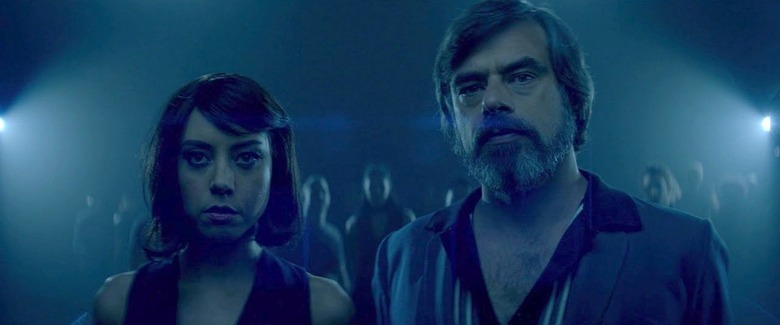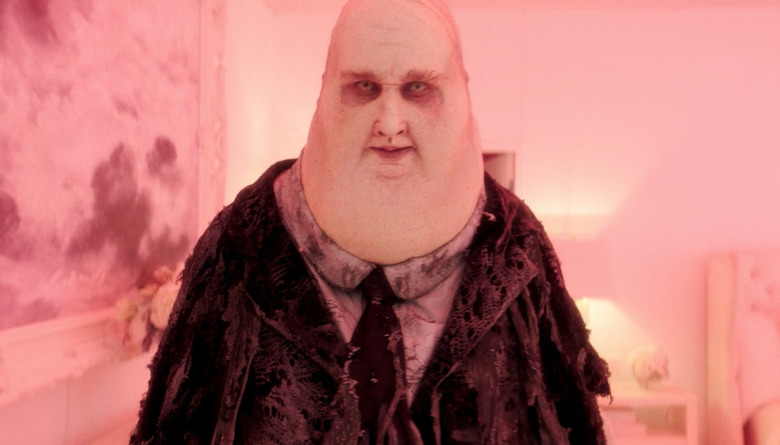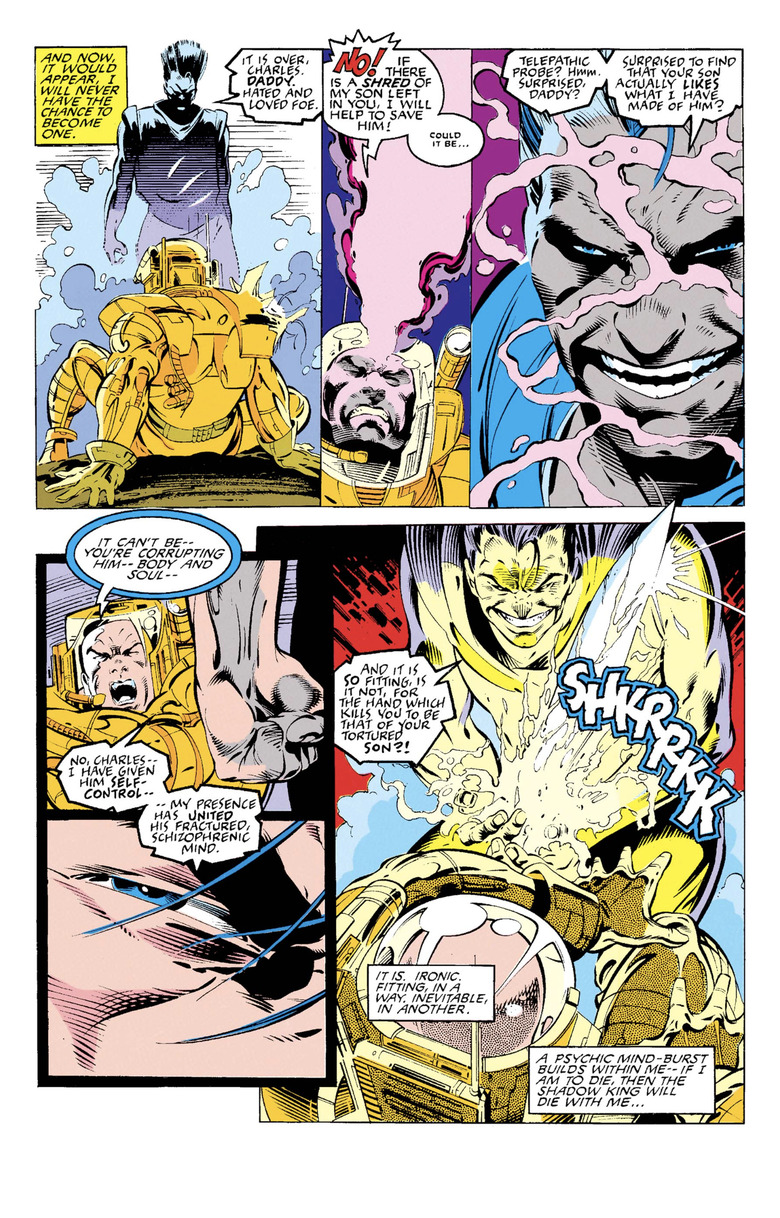'Legion' Shows Noah Hawley Is The Perfect Guy To Tackle Doctor Doom
At San Diego Comic-Con last year, Fargo and Legion showrunner Noah Hawley revealed that he was developing a Doctor Doom movie for 20th Century Fox. This news was met with excitement from fans who feel that the live-action Fantastic Four movies up to this point have done a disservice to the character of Doom — arguably Marvel's greatest super-villain. Recently Hawley talked a little about his vision for the film as a political thriller along the lines of Captain America: The Winter Soldier. Yet the proposed acquisition of Fox by Disney — which could fold the Fantastic Four and X-Men into the Marvel Cinematic Universe — could also complicate matters insofar as it may see some projects that were in development before the acquisition fall by the wayside.
The second season of Legion is now underway on FX and the show has allowed Hawley to carve out his own weird yet worthwhile corner of the X-universe on television. The show's first season introduced one notable Marvel villain in a way that made him truly scary, and there is evidence now from the second season that Hawley may be crafting a Breaking-Bad-like origin tale for another such villain right under our noses. It just goes to show: he's the perfect guy to tackle Doctor Doom.
Willfully Weird
If Legion's ratings are any indication, then the show's willful weirdness may have turned some viewers off early on. Like Hannibal, Season 3, and Twin Peaks: The Return, the show does, at times, seem bent on being as "out there" as it possibly can. Season 2 has only upped the avant-garde quotient, adding female androids with mustaches, a silent admiral who wears a basket over his head, rooms full of people with chattering teeth, and more elaborately choreographed dance numbers.
The dance numbers, in particular, are a stylistic indulgence that can be explained if not always justified as a kind of quirky visual representation of the various forces asserting their influence over the mind of David Haller, the show's main character, played by Dan Stevens. Shot like a music video, a dance-off in the season premiere staged itself more clearly as a contest of wills between David and the characters Oliver and Lenny, played by Jemaine Clement and Aubrey Plaza, respectively. It's just one way that Legion has chosen to eschew the form of traditional action sequences. In the next episode, the show used a wrestling match to express the contest of wills.
With this show and Fargo, Hawley has shown himself to be adept at matching the style of a show to its content. For its part, Fargo did have at least one baffling moment in the form of a deus-ex-machina UFO encounter in its second season. Yet even that moment was of a piece, arguably, with the season's paranoid '70s time setting and the affected, truth-is-stranger-than-fiction air that infused the Mike Yanagita scene in the original Fargo movie.
The resulting effect of the scene as filmed is debatable, but for Hawley as a showrunner and storyteller, it was at least a creative decision that proceeded from a logical foundation. On the whole, his instincts have otherwise served Fargo well, turning the questionable concept of a Coen Brothers TV remake into a rich and rewarding anthology series that managed to remix the familiar beats and calling cards of the Coens' work into something that felt like it could still inhabit the same zany "Minnesota nice" crime world.
Likewise, you could make a case that Legion's offbeat style is a natural byproduct of its unreliable narrator, David, who started out the series as a patient confined to a mental hospital. When you have a main character who cannot trust his own sanity or the nature of the reality he perceives, it's understandable that strangeness might find its way into his orbit and even start building up around him like an accretion disk. Yet in Legion, there are enough pearls of lucidity to be found among the bizarre, style-over-substance moments that it does merit viewing, especially for comic book movie fans who consider the show an extension of the X-Men movie universe.
In recent years, it's been interesting to see that universe stretch outside the comfort zone of PG-13 superhero films with titles Deadpool and Logan. However, even those films have not been quite able to crack the villain problem that has plagued the MCU and other superhero movies outside of it. That is where Legion stands apart. Indeed, those who stuck with the show through its first season were rewarded with an unusual treat: namely, the terrifying screen depiction of a classic comic book villain (who was not the Joker).
From here on out, there will be potential spoilers for everything up to episode 11 of Legion.
The Shadow of a King
When Legion Season 1, started teasing us with glimpses of the Devil with Yellow Eyes — a frightening blob in tattered clothes — the character's visual design almost made me wonder at first if David Haller was trapped in the Mojoverse and this was supposed to be Mojo, the X-Men villain. Mojo, however, holds closer ties to the hero Longshot than he ever did David Haller; and as it turns out, what we were seeing on the show was a different villain.
As anyone who watches the show knows, the Devil with Yellow Eyes turned out to be the Shadow King: a powerful mutant telepath who had become disembodied and attached himself to David's consciousness as a psychic parasite. The entity's bloated appearance was the result of him growing engorged on David's abundant psychic energy. On television in 2017, there was perhaps no more terrifying image than that blob with demonic eyes turning an all-white room red as he stalked David's girlfriend, Syd, played by Rachel Keller, over to a bed at the end of episode 5.
This was Legion's first victory: doing justice to the Shadow King. Even when he was just being embodied by David's old psych-ward buddy, Lenny, there was still an evil-eyed, slinking menace that Aubrey Plaza brought to the character.
As a reader of '90s comics, my first exposure to the Shadow King came in Uncanny X-Men #279, the issue where he takes over the metallic body of the X-Man Colossus and chases Professor X across the X-mansion. I mention that here only because I think being aware of comics history might give some indication for where Legion is headed next and how it could actually be bringing not one, but two X-Men villains to the small screen.
Other comic book readers may remember that David Haller played a key role in two important X-Men storylines. "The Muir Island Saga" fed into the launch of X-Men #1, the best-selling comic book of all time. "Legion Quest" led directly into the landmark Age of Apocalypse event. In both of those stories, David Haller was portrayed as a troubled antagonist. On trading cards, he was actually classified as a super-villain.
Obviously, Noah Hawley is striving to create characters that are more than just one-dimensional baddies. On this week's episode, as David interacted with the Shadow King in his original human form, that of a man named Amahl Farouk, we actually got to hear Farouk deliver a speech that made the conventional Shadow King/Professor X dynamic seem a whole lot more relative, morally, than it was in the comics:
This word — villain — do you know where it comes from? C'est francais. It means, originally, "one who lives in a village." A peasant. Do I seem like a peasant to you? ... No. This is important. Language. The meaning of things. You called me a villain. Me, the king. King of Kings. His majesty, the wise. For decades I rule over my country. I'm a good king. Strong, but just. My people, they prosper. And then, your father, a white man — which is, you tell me, important? — he comes. Does he speak our language? Does he know our customs? And he decides what? That my people should have better? That he knows better? Who is he to make such choices?

Doctor Doom, of course, is also the king of a fictional nation called Latveria. The character is known for his imperious manner and the speech above almost sounds like something that could be transposed verbatim into a movie script where Doom was addressing Franklin Richards, the son of Reed and Sue Richards, AKA Mr. and Mrs. Fantastic.
As CBR points out, Legion seems to be embracing the notion here that every villain is the hero of his own story. That's exactly the kind of treatment Doctor Doom deserves on the big screen. People question whether a comic book movie centered on a villain could work, but there's a huge crop of prestige TV dramas that have already done something similar in the 21st century. Shows like The Sopranos, The Shield, Breaking Bad, and House of Cards have been set in heightened realities where mob bosses, dirty cops, drug dealers, and murderous politicians were sanctioned to thrive as the protagonists of their own stories. It's gotten to the point where anti-heroes have actually become somewhat blase since people started throwing around the term "Golden Age of Television" years ago.
With that in mind, it's not entirely inconceivable that the television version of David Haller could be headed down a road where he eventually breaks bad like his comic book counterpart. The show may already have been hinting at that, in fact. It's shown the level of destruction David was capable of, how he could single-handedly wipe out all of his sister's abductors back at Division 3 during the show's first season. Who better than the most powerful mutant on the planet to usher in the dark future from which Syd seems to be communicating with him this season?
When the younger David manages to interface mentally with the older Syd, she stares at him and says, "I never thought I'd see you again like this." David interprets this to mean he could be dead in the future, to which Syd responds: "It's complicated." This season, we've already had the voice of Jon Hamm narrating a series of sideline vignettes, each of which serves as a commentary on the main narrative. In the most vividly enacted of these vignettes, an unholy delusion — seen as a malformed creature covered in black goo — was shown hatching out of an egg and crawling along the floor until it came upon and killed a cute baby chick (or healthy idea). As this unfolded on-screen, Hamm's voice narrated:
A delusion starts like any other idea, as an egg. Identical on the outside, perfectly formed. From the shell, you'd never know anything was wrong. It's what inside that matters. Albert A had an idea. One day as he was walking, he stumbled. And for a moment it seemed that his right leg didn't belong to him. This is how it begins. The leg was clearly Albert's. It was attached to his body, and when he pricked it, he felt pain. But despite that, the idea grew. Such is the power of an idea. With every day that passed, Albert became more and more certain that this was not his leg. He decided he didn't want it anymore. And so one day, he went to the hardware store. You see, an idea alone isn't enough. We have ideas all the time, random thoughts and theories. Most die before they can grow. For a delusion to thrive, other, more rational ideas must be rejected, destroyed. Only then can the delusion blossom into full-blown psychosis.
When you consider this voice-over in light of Farouk's speech, it seems quite possible that the speech may have just been part of the Shadow King's self-deception as well as his ongoing effort to deceive David and lead him down the road to possible possession in a future episode.
The Comics Connection
In the comics, the destruction of Farouk's body enabled the Shadow King to become a being of pure telepathic energy that could fully inhabit human hosts like David Haller, the son of his arch-rival, Professor Charles Francis Xavier. While Magneto would become the team's greatest enemy, Professor X even said at various points that the Shadow King was the whole reason he formed the X-Men in the first place.
The show has put David on a quest to reunite Farouk with his body, but it's possible that body has been acting as an anchor, weighing down Farouk's spiritual form. It's easy to imagine Farouk tricking David into destroying the body so that he could become an all-powerful psychic entity and thereby possess David. Even if David tries to reject Farouk's pernicious influence and ultimately follows through on killing the Shadow King in body and soul, it's possible that the damage might already be done. Just by talking to Farouk, not to mention secretly conspiring to help him, David has opened his mind up to the planting of delusional seeds. He's like the boy in that other vignette being taught that the color red is called "green" so that he walks out in front of traffic.
If David has other personalities living inside him (as the show's title and his super-villain name in the comics do suggest), then either Farouk himself and/or a more dangerous side to David may soon begin to manifest itself as David's dominant personality. Maybe he's the one who stripped future Syd of one of her arms.
In Breaking Bad, Walter White famously underwent an arc of Mr. Chips to Scarface. Right now, from week to week, on Legion, we could be witnessing a comic book character turned TV protagonist undergo an arc just like that. It's not to say that David would necessarily have to reach a point where he became irredeemable, like Walter. It's just to say that there might be dark things in store for him in the episodes (and seasons?) of the show to come.
Whatever happens, Hawley has definitely mounted what is shaping up to be one of the most unique, visionary comic book adaptations on television. Despite its oddball touches, which might prove endearing for some viewers but frustrating for others, it's also a show with real, undeniable cinematic touches. The opening of this week's episode was the kind of television that would make a channel-surfer stop and sit transfixed, even if it was only for a few minutes until the show cut to its first commercial.
Whatever else it is, Legion gets to the core of David Haller and the Shadow King as characters. Seen as a testing ground of sorts for Hawley's grasp of Marvel villains, it makes a bold statement for what he could do if given a bigger budget, a wider canvas, and a degree of artistic license to tell the story of Victor Von Doom the way he wanted.
Marvel Studios has a track record of more journeyman directors than it does auteurs, so if and when Disney's acquisition of Fox does go through, here's hoping that Hawley would be able to work well under a different sort of showrunner: namely, studio head and MCU architect Kevin Feige. Having seen the vivid way Black Panther's Wakanda was realized on-screen, it would be great to see the MCU pull off another feat of world-building like that with Latveria. If a B-list X-Men villain like Legion can carry his own TV show, there's certainly no super-villain more deserving of his own movie than Doctor Doom.



